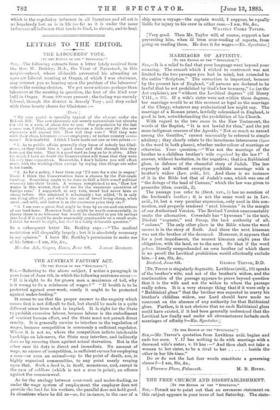MARRIAGES OF AFFINITY.
I To THE EDITOR OF THE " srEcTATos.'n SIR,—It is a relief to find that your language went beyond your meaning. The remark which I wished to controvert was not limited to the two passages you had in mind, but extended to the entire " Scripture." The correction is important, because by the present law of England, "all persons are declared to be lawful that be not prohibited by God's law to marry," i.e. (as the Act explains), are " without the Levitical degrees " (32 Henry VIII., c. 33). If a wife's sister were not within these degrees, her marriage would be at this moment as legal as the marriage of the Clergy, whatever any ecclesiastical law might say. The marriage of a Roman priest, lawfully solemnised in England, is good in law, notwithstanding the prohibition of his Church.
With regard to the two cases in the New Testament, the words of the Baptist, " It is not lawful for thee," and the yet more indignant censure of the Apostle, " Not so much as named among the Gentiles," cannot reasonably be referred to simple adultery ; they clearly relate to the incestuous intercourse (IxEa. is the word in both places), whether under colour of marriage or otherwise. Your question,—" Was not the marriage of the brother to a childless brother's wife required by the law ?" I answer, without hesitation, in the negative ; that is a Rabbinical gloss, in defence of the shameful story of Judah. The law expressly and without exception prohibits marriage with abrother's widow (Lev. xviii., 16). And there is no instance of it in the Bible but that of Judah's sons, which was one of "the doings of the land of Canaan," which the law was given to proscribe (Gen. xxxviii., 2).
The passage you refer to (Dent. xxv., 5) has no mention of the husband's brother ; it is not the same word as in Levxviii., 16, but a very peculiar expression, only used in this connection, and properly rendered " next kinsman " in the margin of our Authorised Version. The Revised Version unaccountably omits the alternative. Coverdale has " kynsman " in the text, Diodati " cognato," and Proop, the best authority of all,. " cuiiano." The only other place in the Bible where the word occurs is in the story of Ruth. And there the next kinsman was not the brother of the deceased. Moreover, it appears that for a just impediment, the nearest kinsman might pass the obligation, with the land, on to the next. So that if the word yebans literally comprehended an own brother (of which there is no proof) the Levitical prohibition would effectually excludehim.—I am, Sir, rte., Beeford, .Tune 8th. ' GEORGE TRETOR, D.D.
[Dr. Trevor is singularly dogmatic. Leviticus (xviii., 16) speaks of the brother's wife, and not of the brother's widow, and thecontinuation of the passage appears to prove beyond question that it is the wife and not the widow to whom the passage really refers. It is a very strange thing that if it were only a "Rabbinical gloss" that the brother was expected to marry his brother's childless widow, our Lord should have made no comment on the absence of any authority for that Rabbinical gloss. Further, is it not obvious that no such Rabbinical gloss could have existed, if it had been generally understood that the Levitical law finally and under all circumstances forbade such marriages of affinity ?—En. Spectator.]


































 Previous page
Previous page